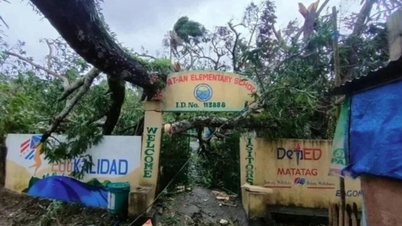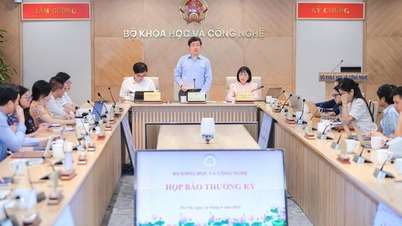On the afternoon of September 23, PwC Vietnam held a ceremony to announce the ESG Practice Progress Survey Report 2025. The report was built based on the ESG practice progress survey with 174 business representatives in Vietnam.
Speaking at the announcement ceremony, Ms. Dinh Thi Quynh Van, Chairman of PwC Vietnam, said that according to PwC's global research "Value in Motion", trillions of USD are being reallocated into new and sustainable value sectors.
“This is not just a trend, but the biggest shift in the coming era, driven by three irreversible forces: Climate change, technological breakthroughs and changes in social expectations,” the Chairman of PwC Vietnam emphasized.
Legal compliance is the number 1 driver of ESG in Vietnam
For Vietnam, Ms. Van believes that this global shift perfectly converges with the national orientation on green growth, opening up unprecedented opportunities, and is also an urgent call to action for every business.
According to experts from PwC Vietnam, for an export-oriented economy like Vietnam, meeting international ESG standards is a prerequisite to maintaining competitiveness. Vietnamese enterprises must integrate ESG into their core operations and harmonize with sustainable development goals at both the global and national levels.
The report found that 89% of business representatives surveyed have or are planning to make ESG commitments in the next 2-4 years, a significant increase from 80% in 2022.
The proportion of enterprises without ESG plans fell to 11%, while 54% had implemented their commitments. FDI enterprises led the way with 71% adopting ESG thanks to compliance with global standards; listed enterprises reached 57% thanks to pressure from investors and legal regulations. Private/unlisted enterprises were slower, with only 27% implementing and 23% still not having a plan, reflecting higher barriers and lower priority.

Mr. Nguyen Hoang Nam, Deputy General Director, ESG Services Leader, PwC Vietnam (Photo: BTC).
Mr. Nguyen Hoang Nam, Deputy General Director, ESG Services Leader, PwC Vietnam, said: “With a commitment level of 89% of the businesses participating in the survey, I see this as a very positive signal.”
In particular, according to this person, the awareness of ESG risks and opportunities in the Vietnamese market in the global context is being driven by many drivers including compliance with current regulations in Vietnam, meeting the requirements of customers, investors, financial lenders, as well as the wishes of employees and leaders of companies.
“On that basis, businesses tend to want to access green finance sources to take advantage of preferential capital costs, maintain and increase competitive advantages,” he said.
Seventy percent of businesses surveyed said legal compliance was the top driver behind ESG implementation, affirming this as the primary reason, followed by pressure from stakeholders (40%) and direction from senior leadership (39%).
Only 16% of businesses see cost reduction as a driver of ESG implementation. Similarly, only 25% see access to finance as a top driver, suggesting that the benefits of green finance are not yet well understood or accessible.
Mr. Nguyen Hoang Nam assessed that the survey results accurately reflect the context of Vietnam. “We also know that Vietnam is still in the early stages of putting ESG commitments into practice, so the level of maturity is not too high. On that basis, the priority of Vietnamese enterprises is to find ways to access sustainable financial sources and green finance,” he said.
Challenges in ESG practice
Mr. Nam pointed out several important challenges in the practice of ESG in Vietnam.
Firstly, in Vietnam there are currently no mandatory regulations or specific legal frameworks, but most businesses will still use the world's sustainable development reporting frameworks.
Second, the big challenge lies in collecting databases for sustainability reports. The report integrates many areas in the enterprise, so it takes time to collect information, data, evaluate, measure, and importantly, ensure reliability. The issue of data will be a key factor in the coming time, requiring enterprises to actively change to ensure better reliability.

Vietnam is still in the early stages of putting ESG commitments into practice (Photo: AITCV).
Mr. Nam believes that Vietnam needs to be more proactive in training and raising awareness of human resources. Thereby, human resources can assess ESG risks and opportunities, then integrate them into operational strategies in the most effective way.
In addition, according to Mr. Nam, businesses participating in the survey also expect to have more preferential policies to support businesses practicing ESG.
These incentives can come from State policies, tax policies, green and sustainable financial policies, to create preferential capital sources for businesses to access.
Source: https://dantri.com.vn/kinh-doanh/esg-tai-viet-nam-70-doanh-nghiep-coi-tuan-thu-phap-ly-la-dong-luc-20250923212256798.htm





![[Photo] Prime Minister Pham Minh Chinh attends the groundbreaking ceremony of two key projects in Hai Phong city](https://vphoto.vietnam.vn/thumb/1200x675/vietnam/resource/IMAGE/2025/9/27/6adba56d5d94403093a074ac6496ec9d)










































































































Comment (0)